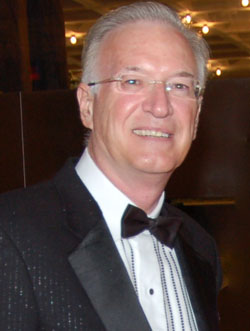South Florida's Best and Brightest
Originally published: Tuesday, February 1, 2011 (12:01:00 a.m. ET)
Roy Black
His client-list reads like a veritable who's who
of American popular culture.
Radio host Rush Limbaugh, artist Peter Max, racecar driver Helio Castroneves, physician William Kennedy Smith,
adult entertainment tycoon Joseph Francis, and actor Kelsey Grammer, to name just a small sample.
He's been recognized as one of the country's most
talented attorneys by every entity that monitors the
field of law, and he was nominated in 2010 for the
Super Lawyer Advisory Board.
Indeed, Roy Black is the civil and criminal defense attorney
anyone who can afford his firm's
fee turns to first
when legal troubles arise.
Black, who earned both his undergrad and law degrees
from the University of Miami (1967 and 1970, respectively), also has
provided commentary and analysis
at one time or another for every one of the four broadcast
television networks (ABC, CBS, FOX, and NBC). Black is a senior partner at the downtown firm
Black, Srebnick, Kornspan & Stumpf, P.A.
Q: What advice would you give youngsters who want to embark on a career in your industry?
A: I tell them that it is never too early to design a career. No one gets to the top by stumbling along the path of life, hoping success will find them. Start with a strong foundation by relentlessly studying the basics. Reading, writing and speaking are the hallmarks of a trial lawyer. Master the English language, for it will be your most potent weapon. The rest will follow.
Q: Of what professional accomplishment are you most proud?
A: The fact that I want to pass on the idiosyncratic knowledge that I have absorbed in my 40 years of courtroom work. I do it at the [University of Miami] law school and by creating seminars for lawyers. For example, last year I created a seminar called Law as a Performance Art. I believe that every time a lawyer appears in court, it is a performance. Don't confuse this type of performance with acting; this performance requires you to intensely prepare, think out your words, and make a powerful impact. No matter how minor the appearance may seem, always make it a peak performance. I use a combination of video, audio, and PowerPoint to illustrate my thesis.
Q: What's the most challenging part about your work?
A: The will to win is a meaningless cliché. Everyone wants to win. But few want to put in the work that winning requires. Thus, have the will to prepare to win. Relentlessly, every time, all the time. Self-discipline is the key. Can you see it through to the finish?
Q: What did you envision doing for a living when you were growing up?
A: I was too busy playing sports to give it much thought. We Americans are too obsessed with sports. If our academic achievement had as much impact as a football game, it would change the world. I read recently that a local billionaire gave $80 million to his college for a hockey stadium. Hockey? Give me a break. I chastise lawyers in my seminars because they spend more money on their golf game than on improving their legal skills. Invest in your skills. The return will be greater than any other investment you make.
Q: In ten years' time, I will be _________________.
A: In ten years, I will be doing exactly the same thing I am now, representing people in court. It is all I do and all I want to do.
Q: Who are/were your professional role models and why?
A: Winston Churchill, Martin Luther King, Jr., and Nelson Mandela. I like to think big!
Q: If you could do anything else in the world for a living, what would it be?
A: I like teaching. I have taught a course in trial evidence at UM for 35-plus years. I believe no one knows anything well until he can teach it to someone else. Unfortunately, this is all I know, so I would have to teach law.
Q: What's the best part about your job?
A: I like the mental game. Working out the strategy, thinking many moves in advance, setting the traps, out-thinking the other side.
Q: What's the worst part about your job?
A: Glancing at the clock at 3 a.m. and realizing there are several hours of work ahead.
Q: What is your biggest professional regret?
A: At the end of every case I do a postmortem. I am particularly tough on myself. I second-guess every decision. I can take losing; my only regrets are when I think I didn't work hard enough to succeed.
Q: What's your favorite South Florida charity?
A: This one is easy. The Blacks' Annual Gala. For the past 15 years, my wife, Lea, and I have raised money to educate kids who have never gotten a break. The forgotten, the unpopular, even the despised. The kids locked up in our broken juvenile justice system. Money raised is used to get them out of jail and into a classroom. Today, the answer for every problem is jail and more jail. It is time to wake up and realize this doesn't work. A decent education and a job does.

